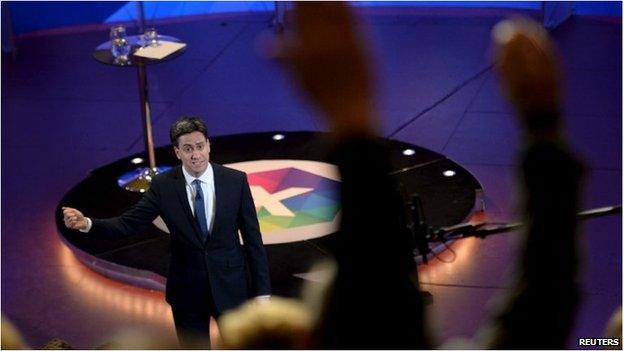Did Labour over-spend?
- Published
- comments

Members of the Question Time audience became conspicuously grumpy when Ed Miliband said the last Labour government did not over-spend.
So who was right - them or the Labour leader?
Well, they both have a point.
There was a gap between what Labour was spending and what it was receiving in tax revenues in the few years before the great crash and recession of 2008.
But that gap was not massive: sometimes it was a tiny bit bigger than the growth rate of the economy, sometimes a bit smaller; which means there was no significant increase in the ratio of public sector debt to national income or GDP.
Thus in 2007-8, public spending was 40.2% of GDP, compared with tax revenues that were 37.5% of GDP: so the deficit was 2.7% of GDP.
No shouting
Now there are plenty of economists and mainstream politicians who regard both public spending of that magnitude and a deficit of that scale as sustainable and indeed sensible.
And to put those figures into context, public spending by the government of Margaret Thatcher was significantly higher than that for her first seven years in office - and she consistently ran a deficit of that scale till her last three years in office.
So it is quite hard to describe the fiscal conduct by the government of Tony Blair and Gordon Brown as wildly irresponsible. And, to be clear, neither George Osborne or David Cameron were at the time shouting that the Labour government was maxing out the credit card and was about to bankrupt Britain.
But that is not to let Miliband or his predecessors off the hook.
Insane and greedy
The Question Time audience did not seem altogether satisfied with the mea culpa that Ed Miliband did make, namely that Labour's mistake was to put in place inadequate oversight of the banks to prevent them behaving recklessly and mullering the economy.
And the audience's unease may not be irrational.
Of course the crisis would have been less acute if the Financial Services Authority and the Bank of England had taken earlier prophylactic action to prevent the banks lending and investing in their insane and greedy way.
Wilful and wrong
But Labour wasn't just asleep at the wheel when it came to City regulation. Arguably it was drunk at the wheel - in that it loved the City boom, for generating huge tax revenues that it then lavished on public services.
So the failure to keep the City properly in check was in a sense wilful and therefore doubly wrong.
And there's another thing. Even best-in-class regulation of the City can't protect any economy from periodic shocks.
Which is why there is something to be said for George Osborne's favourite cliche, that it is sensible to mend the roof when the sun is shining.
Or to put it another way, when the economy is growing strongly, as it did through most of Labour's years in office, it probably does no harm to finance growth in public services largely through the proceeds of growth, rather than through borrowing.
Why? Well, the lower the national debt at the time recession bites, the more scope there is to borrow to protect public services and increase benefits, to shield people from the pain of recession.
Austerity, austerity
The point is that since 2007-8, and as a direct result of the recession-induced collapse in tax revenues and surge in public spending on benefits, the national debt has doubled, from roughly 40% of GDP to 80% of GDP.
And the bleedin' obvious point is that if the national debt was today nearer 70% of GDP, almost the entire debate of this general election campaign wouldn't have to be about how much more austerity is needed and the timing of that austerity.
None of which is to say that the Tories are right to argue that the best thing for the economy at this juncture is to turn the deficit into a surplus as soon as possible: the Labour and Liberal Democrat case that a slower pace of welfare and departmental cuts would be fairer and better for our prosperity is supported by many economists.
What's more the debate remains lively (ahem) about whether the scale of cuts made by the current Tory and LibDem government in its early years was too great, and imposed too much hardship in the cause of regaining fiscal credibility.
But although Ed Miliband could plausibly argue that the Tories and LibDems forced more austerity on us than was necessary, it is not altogether surprising that his circumscribed admission of culpability for our economic woes causes a good deal of harrumphing.